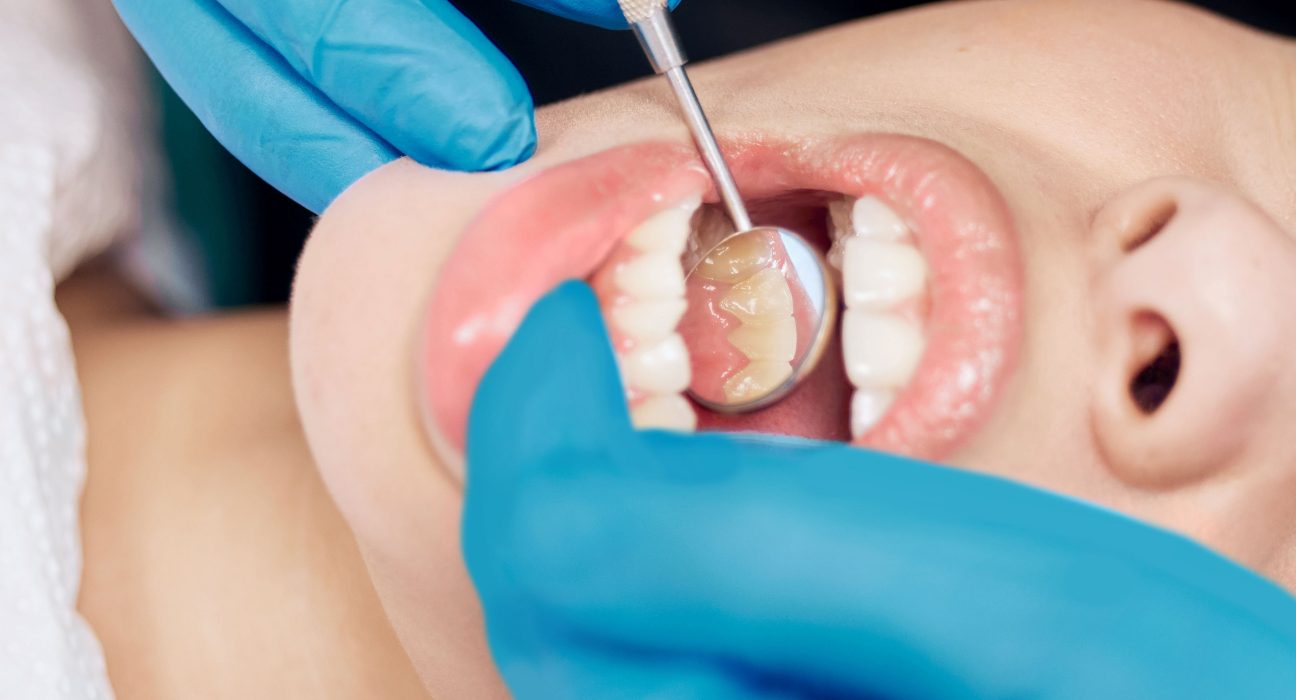Did you recently find some stains on your veneers, leaving you puzzled about dental veneer stains?
A beautiful smile is often associated with increased self-confidence. Veneers have emerged as an affordable treatment option that helps in improving the appearance of damaged or discolored teeth. Veneers are also helpful in cases where you are wishing to change the size and shape of your teeth.
In this blog, we will try and understand how to prevent stains on dental veneers.
Do veneers stain?
Yes, like natural teeth veneers also stain. However, unlike natural teeth, porcelain veneers don’t stain. That is because porcelain is non-porous, which means coffee, wine, and other common stain-causing beverages do not penetrate its surface.
Several dental clinics use stain-resistant porcelain to create custom veneers which helps people to get a beautiful smile that lasts for decades.
Contrary to porcelain veneers composite veneers are made from resin, which is more porous than porcelain, they can stain over time. Composite veneers typically last only five to seven years before they need to be replaced.
What Are The Common Causes Of Stained Veneers?
Veneers get stained because of two factors, the intrinsic factor and the extrinsic factor. Let us understand both the factors:
Staining Caused By Intrinsic Factors:
This type of staining usually occurs in composite veneers, when the veneer absorbs food colors thereby changing its color permanently.
Also due to tooth wear, composite veneers may change color as they age.
Furthermore various foods and drinks, such as curries and red wine, also change the color of composite veneers.
However indirect composite veneers made in laboratories tend not to stain very much.
Staining Caused By Extrinsic Factors (Surface Stain):
Generally, extrinsic staining happens as a result of the daily use of tea, coffee, red wine, and curries.
It can also occur in smokers.
High gloss veneers will not stain in this way.
Composite veneers and porcelain veneers can stain due to excess texturing on their surfaces.
How to prevent veneer stains?
Veneers are commonly used to improve the appearance of your teeth. Generally, the thin shells of veneers are made of porcelain or composite material. However, veneers can stain if they are not properly cared for. In order to keep your veneers looking their best, follow these 10 steps.
Brush And Floss Your Teeth Regularly:
A good way to prevent staining on veneers is to brush and floss regularly. In order to prevent damage to your veneers, it is important to use a soft-bristled toothbrush and fluoride toothpaste. This will remove food particles and plaque from your teeth and veneers.
Food And Drinks To Avoid:
If you want to keep your veneers looking their best, it is best to avoid coffee, tea, red wine, and dark-colored fruits and vegetables.
Use A Straw:
Sometimes drinking certain beverages can stain your veneers. To avoid staining it is best to use a straw. The straw will help to keep the liquid away from your teeth and veneers, reducing the risk of staining.
After Eating, Rinse Your Mouth With Water:
You can reduce the risk of staining your teeth and veneers by rinsing your mouth with water after eating.
Avoid Smoking Cigarettes:
Keeping your veneers looking their best means avoiding smoking. Smoking can stain your veneers.
Use A Veneer Friendly Whitening Toothpaste:
A whitening toothpaste helps in reducing stains on your veneers. However regular whitening toothpaste can be too abrasive and cause damage to the veneers. So you must look for a whitening toothpaste that is especially designed for veneers.
Refrain From Grinding Your Teeth:
If you grind your teeth at night, you must wear a mouth guard. Mouthguard helps in preventing any damage caused to your veneers because of your teeth grinding.
Visit Your Dentist Regularly:
Visiting your dentist regularly is important for maintaining the health of your veneers. Your dentist can check for any signs of damage or staining and provide advice on how to prevent staining.
Use a Soft-Bristled Toothbrush:
Soft-bristled toothbrushes play a crucial role in preventing stains on your veneers as they are gentle on the surface of the veneers. Hard-bristled toothbrushes can be abrasive and may cause damage to your veneers.
Rinse Your Mouth With Mouthwash.:
By using a mouthwash you can reduce the chances of getting your veneers stained. While choosing a mouthwash you must consider a mouthwash that is specifically designed for veneers because regular mouthwashes can damage your veneers as they are abrasive.
Conclusion:
In conclusion, veneers can indeed stain but it largely depends on the type of veneer and how well they are cared for. By following these few simple cautions, you can prevent staining on your dental veneers and keep them looking their best.
Regular brushing and flossing, avoiding certain foods and drinks, using a straw when consuming dark liquids, rinsing after meals, avoiding smoking, using a whitening toothpaste designed for veneers, wearing a mouthguard if you grind your teeth at night, visiting your dentist regularly and using a soft-bristled toothbrush can all contribute to maintaining the appearance of your veneers.
With proper care and maintenance, you can enjoy a beautiful smile with stain-free veneers for years to come.
If you are thinking about getting dental veneers but are unable to find a good dentist near you, do not worry. Our team will help you find the best dentist who can help you get dental veneers in your area. At Know Your Health we constantly strive to help you with better healthcare facilities near you at an affordable price.
Ref:






